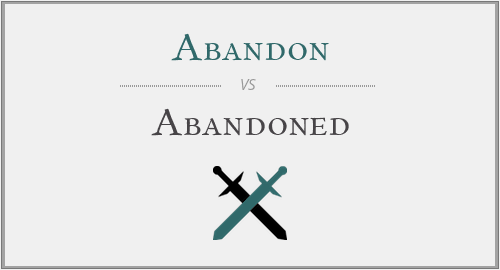Grammatical Roles:
"Abandon" and "abandoned" assume different grammatical roles within a sentence. "Abandon" functions as a verb, denoting the act of willingly or deliberately leaving behind, relinquishing, or forsaking someone or something. On the other hand, "abandoned" serves as an adjective, describing the state or condition of being left behind, deserted, or forsaken.
Active vs. Passive Voice:
The distinction between "abandon" and "abandoned" also lies in the active and passive voice constructions. "Abandon" represents an action carried out by the subject, illustrating agency and volition. It emphasizes the active role of the agent in the act of abandonment. In contrast, "abandoned" portrays a state or condition resulting from the action of abandonment, putting the focus on the object or recipient of the action. It highlights the passive nature of the entity that has been left behind.
Subjective vs. Objective Perspective:
The usage of "abandon" and "abandoned" reflects subjective and objective perspectives, respectively. "Abandon" suggests a subjective experience, indicating a deliberate decision made by an individual or entity to sever ties, let go, or detach emotionally. It implies a sense of agency, personal choice, or even liberation. Conversely, "abandoned" adopts an objective standpoint, describing the state of being left behind or discarded by others. It carries connotations of vulnerability, neglect, or loss, highlighting the experience from the recipient's viewpoint.
Emotional Connotations:

The emotional undertones associated with "abandon" and "abandoned" further contribute to their distinctiveness. "Abandon" often elicits sentiments of freedom, liberation, or empowerment when used in a positive context. However, it can also evoke feelings of betrayal, disappointment, or distress when employed in negative or emotional contexts. Conversely, "abandoned" evokes emotions of loneliness, despair, or rejection, emphasizing the emotional impact on the entity that has been left behind. It conveys a sense of loss or abandonment, reflecting the emotions experienced by the recipient.
Temporal Perspective:
Another aspect that sets "abandon" and "abandoned" apart is the temporal dimension. "Abandon" encompasses the present or future, referring to an ongoing or anticipated action of leaving behind or forsaking. It suggests an active choice or decision made in the present or projected into the future. On the other hand, "abandoned" primarily pertains to the past, describing the aftermath or result of a previous act of abandonment. It highlights a state that has endured or persisted due to past abandonment.
Conclusion:
In conclusion, the distinction between "abandon" and "abandoned" lies in their grammatical functions, voice constructions, perspectives, emotional connotations, and temporal implications. "Abandon" operates as an active verb, emphasizing agency and subjective experience, while "abandoned" serves as an adjective, focusing on the passive state or condition resulting from abandonment. Understanding these linguistic nuances enables us to navigate the complexities of human emotions, interpersonal relationships, and the consequences of our actions. So, whether we confront the act of "abandon" or witness the impact of being "abandoned," these words remind us of the multifaceted nature of language and its power to illuminate the intricacies of our shared human experience.




Have a discussion about this article with the community:
Report Comment
We're doing our best to make sure our content is useful, accurate and safe.
If by any chance you spot an inappropriate comment while navigating through our website please use this form to let us know, and we'll take care of it shortly.
Attachment
You need to be logged in to favorite.
Log In